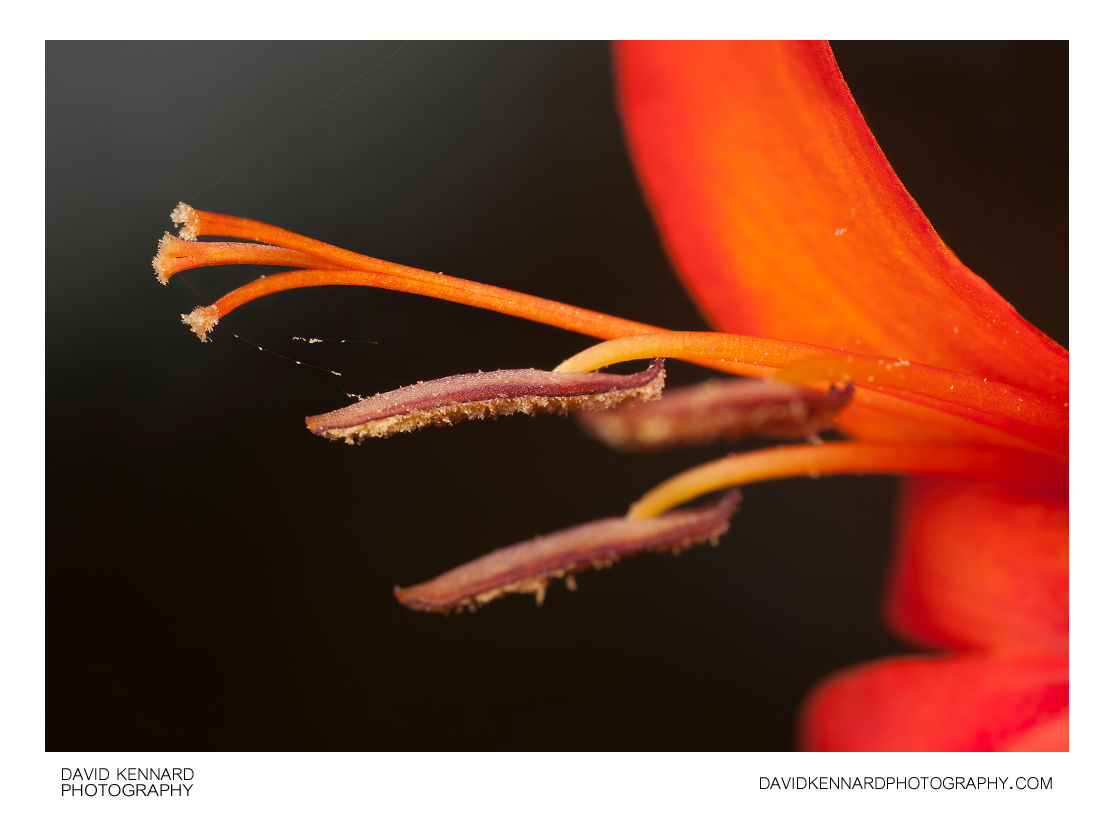Anthers and stigma of a Crocosmia flower

Description
- Title:
- Anthers and stigma of a Crocosmia flower
- Caption / Description:
-
There a large range of Crocosmia cultivars, many with very similar coloured flowers, height, and leaves, making identification difficult.
From Wikipedia (http://en.wikipedia.org/wiki/Crocosmia):
Crocosmia (J.E. Planchon, 1851; pronounced /krɵˈkɒzmiə/) is a small genus of perennial species in the iris family Iridaceae, native to the grasslands of Cape Floristic Region, South Africa. They can be evergreen or deciduous perennial herbs, that grow from basal underground corms. The basal, alternate leaves are cauline (meaning, belonging to the stem) and distichous (meaning, growing in two vertical ranks). The leaves are linear or lanceolate. The blades are parallel-veined. The margin is entire. The corms are unusual in forming vertical chains with the youngest at the top and oldest and largest buried most deeply in the soil. The roots of the lowermost corm in a chain are contractile roots and drag the corm deeper into the ground where conditions allow. The chains of corms are fragile and easily separated, a quality that has enabled some species to become invasive and difficult to control in the garden.
They have colourful inflorescences of 4 to 20 vivid red and orange subopposite flowers on a divaricately branched stem. The terminal inflorescence can have the form of a cyme or a raceme. These flower from early summer well into fall. The flowers are sessile on a flexuose arched spike. The fertile flowers are hermaphroditic. All stamens have an equal length. The style branches are apically forked. They are pollinated by insects, birds (hummingbirds) or by the wind. The dehiscent capsules are shorter than wide.
They are commonly known in the United States as coppertips or falling stars, and in Britain as montbretia. Other names, for hybrids and cultivars, include antholyza, and curtonus. The genus name is derived from the Greek words krokos, meaning "saffron", and osme, meaning "odor".
Crocosmias are grown worldwide, and more than 400 cultivars have been produced. Some hybrids have become invasive species especially C. x crocosmiiflora hybrids which are invasive in the UK, New Zealand, the American Pacific Northwest, and probably elsewhere.
- Tags / Keywords:
-
- Biota
- Life
- Vitae
- Eukaryota
- Orange
- Plantae
- Plants
- Magnoliophyta
- Flowering Plants
- Angiosperms
- Liliopsida
- Monocotyledons
- Asparagales
- Iridaceae
- Iris
- Red
- Crocosmia
- Montbretia
- Stigma
- Anthers
- Stamens
Admin
- Date Original Photo Taken:
- Original File Name:
- _MG_3194-5.psd
- Event:
- Rating:
- ☆
- Date this image added/last updated on website:
- Original File Dimensions:
- 4386px x 3048px
- File Type:
- JPEG
- Color Mode:
- RGB
- Original Image Color Profile:
- Adobe RGB (1998)
Location
- Location Created:
-
- Sublocation:
- City:
- Market Harborough
- Province/State:
- Leicestershire
- Country:
- United Kingdom
- World Region:
- Europe
- Geo-location:
Rights
- Copyright Status:
- Copyrighted
- Licensing Status:
- Rights Managed
- Available for Editorial Use:
- Yes
- Available for Commercial Use:
- Yes
- Copyright Notice:
- © 2010 Dave Kennard
Camera Data
- Date Digital Resource was created:
- Shutter speed:
- 1⁄200 s
- Aperture:
- f/8
- Camera Model:
- Canon EOS 450D
- ISO:
- 100
- Exposure Compensation:
- 0
- Focal Length:
- 65mm
- Focal Length (35mm equiv.):
- Metering Mode:
- Multi-segment
- Flash:
- On, Fired
- Exposure Mode:
- Manual
- White Balance:
- Manual
- Light Source:
- Exposure Program:
- Manual
Additional shooting metadata
- Lens:
- Canon MP-E 65mm F2.8 1-5x Macro
- Filters used:
- Additional Optics used:
- Setup:
- Handheld
Canon MT-24EX Macro Twin Flash
Post Processing
- Image Modified:
- Software used:
-
- Adobe Camera RAW
- Adobe Photoshop CS5
- Post Processing:
-0.75 exposure compensation in ACR
Images blended for focus in PS CS5 with some cloning and warping involved
